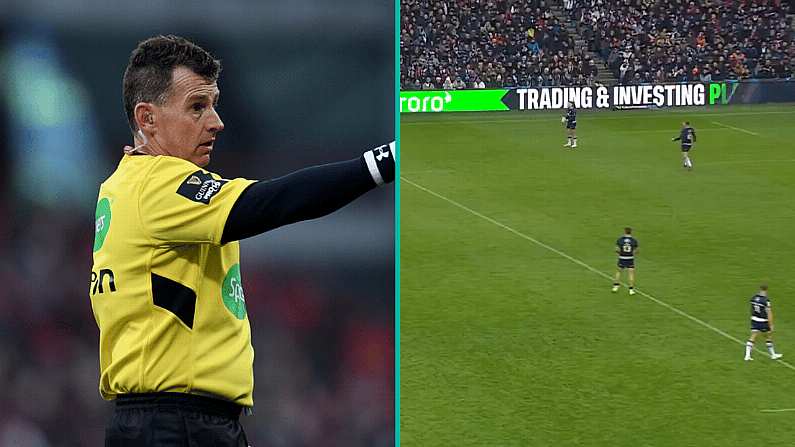While there has been some intriguing action so far in this year's Six Nations, there have been some concerns about the use of a current loophole in the laws of rugby and its impact on the spectacle of the sport.
Commonly referred to as the 'Dupont law', this law means that teams do not have to retreat after one of their own kicks as long as they remain static and allow the catching team to either pass the ball or advance five metres.
This is how Bernard Jackman recently summed up the issue on RTÉ:
It's called the Dupont law because a year-and-a-half ago Antoine Dupont, the French captain, went to the referee before the match.
He explained that on kick-tennis battles, they don't actually have to retreat, they don't have to be put onside, as long as they stay static. If the catcher of the ball runs five metres or throws a pass, then they're onside.
It's something the lawmakers are going to have to change.
In practice, this loophole can ruin the spectacle of a game as it can halt the action on the pitch and allow players to kick the ball unchallenged. We saw a prime example of it in action during yesterday's game between Scotland and France.
"It's going to ruin not just this game, but the game itself!"
The Dupont loophole on show at Murrayfield...#SCOvFRA | #GuinnessSixNations pic.twitter.com/hDryJ0ldud— Virgin Media Sport (@VMSportIE) February 10, 2024
It is certainly something that the authorities will be looking at changing in the near future.
READ HERE: Controversial Scotland Vs France Decision Gave Ireland Fans Flashbacks To 2007
Nigel Owens suggests solution to law that is plaguing rugby
With those involved in top rugby constantly seeking to improve the excitement of the biggest games, this is a law that needs to be changed.
Writing in his column for Wales Online, former referee Nigel Owens suggested what he feels would be a rather straightforward solution to the issue.
There is a loophole in the law, which has been used fairly frequently in recent months.
If you are more than 10 metres away from where the ball lands, you don’t have to retreat – you can stand still, until you’re put onside. As long as they don’t move forward, they can just stay still.
As that viral clip from the Bath v Gloucester game earlier this year showed, it can create a farcical situation that is not at all entertaining to watch.
Can we close the loophole? Potentially.
A solution may be to say, whether you’re within 10 metres of where the ball lands or not, you still have to move back towards your own goal line until you’re put onside.
This of course will be more work for the referee and his team, as they would now have to make sure that players retreat and not just advance.
It wouldn’t be that hard to follow though, I think, and maybe that will allow the catching side more space to counter attack and lead to less kicking. I might be wrong, but I can’t really see any negative effect this could have anywhere else.
This is certainly an interesting solution.
It would require kicking teams to retreat until they are onside, regardless of the actions of the catching team. As Owens points out, this in theory should create more space for the attacking team to run into and encourage a more exciting brand of rugby.
It is something that the lawmakers should look at.












